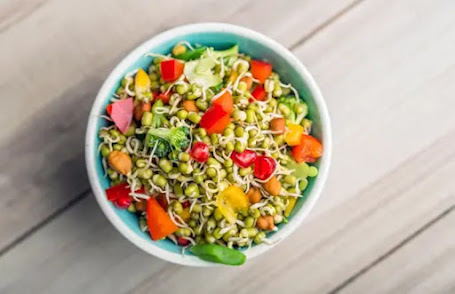What is High Protein Foods? – Definition,15 Types of High Protein Foods
Introduction

High protein foods are an essential component of a balanced
diet and play a crucial role in maintaining overall health and well-being. These
foods are characterized by their elevated protein content, which is vital for
various bodily functions. In this discussion, we will define high protein foods
and explore 15 types of such foods, ranging from animal-based to plant-based
and alternative sources. Understanding the significance of high protein foods
is essential for making informed dietary choices and optimizing nutrition.
A. Definition of High Protein Foods infotechnologyiespro
High protein foods are dietary items that contain a
significant and concentrated amount of protein relative to their total caloric
content. Protein is one of the three macronutrients, alongside carbohydrates
and fats, and is composed of amino acids, the building blocks of life. Foods
that fall into the category of high protein are typically characterized by
having a higher proportion of protein compared to other nutrients.
The exact definition of what constitutes "high"
protein can vary depending on individual dietary needs and preferences.
However, in general, foods are considered high in protein when they contain a
substantial amount of protein per serving, often exceeding the protein content
found in typical foods. High protein foods are valued for their ability to
provide essential amino acids, support muscle growth and repair, promote
satiety, and contribute to various bodily functions.
In the context of a balanced diet, high protein foods are an
important component that can help individuals meet their daily protein
requirements, whether they are looking to build muscle, manage their weight, or
simply maintain overall health.
B. Importance of High Protein Foods in Diet
High protein foods play a crucial role in a well-rounded and
nutritious diet for several reasons:
Muscle Growth and Repair: Proteins are essential for
building and repairing muscles. Athletes and individuals engaged in physical
activities often require a higher protein intake to support muscle development
and recovery.
Weight Management: Protein-rich foods help with weight
management by promoting a feeling of fullness and reducing overall calorie
consumption. They can assist in controlling appetite and cravings, making it
easier to maintain or lose weight. theehealthcareblog
Metabolic Health: Adequate protein intake supports a healthy
metabolism. It can help regulate blood sugar levels, improve insulin
sensitivity, and contribute to better overall metabolic health.
Tissue Maintenance: Protein is not only critical for muscle
but also for the maintenance of other body tissues, including skin, hair,
nails, and internal organs.
Immune Function: Proteins are involved in the production of
antibodies and immune system components, playing a role in defending the body
against infections and diseases.
Enzyme and Hormone Production: Many enzymes and hormones
crucial for various bodily functions are madeup of proteins. These include
digestive enzymes, insulin, and growth hormones.
Transportation of Nutrients: Proteins can bind to essential
molecules like oxygen and carry them throughout the body via the bloodstream.
Hemoglobin, for instance, is a protein responsible for transporting oxygen in
red blood cells.
Healthy Skin and Hair: Proteins such as collagen and keratin
are vital for maintaining healthy skin, hair, and nails.
Cell Structure: Proteins are a fundamental component of cell
membranes and are involved in maintaining cell integrity and function. wwwnaaturalhealth
Tissue Repair: Injuries, surgeries, and illnesses often
require increased protein intake to support tissue repair and recovery.
Incorporating high protein foods into one's diet is
essential for meeting these various health and nutritional needs. However, it's
important to balance protein intake with carbohydrates, fats, vitamins, and
minerals to ensure a well-rounded and complete diet that supports overall
health. The specific protein requirements may vary depending on age, gender,
activity level, and individual goals, but high protein foods remain a valuable
component in any diet.
III. Benefits of High Protein Foods
Consuming high protein foods offers a range of health
benefits that impact various aspects of well-being:
A. Muscle Building and Repair:
High protein intake provides the necessary amino acids for
muscle protein synthesis, promoting the growth and repair of muscle tissue.
This benefit is particularly significant for athletes,
bodybuilders, and individuals engaged in strength training.
B. Weight Management:
Protein-rich foods increase feelings of fullness and
satiety, reducing overall calorie intake and aiding in weight management.
High protein diets can help prevent overeating and reduce
cravings for unhealthy snacks.
C. Increased Satiety: marketinglefts
Protein has a higher satiety index compared to carbohydrates
and fats, helping individuals feel satisfied and less likely to overeat.
This can be particularly helpful for those trying to control
portion sizes and manage their weight.
D. Nutrient Density:
Many high protein foods are nutrient-dense, meaning they
provide essential vitamins and minerals along with protein.
Examples include lean meats, fish, and dairy products, which
offer a range of nutrients like iron, B vitamins, and calcium.
E. Improved Metabolic Health:
Adequate protein intake can contribute to better metabolic
health by helping regulate blood sugar levels and improving insulin
sensitivity.
This is beneficial for individuals at risk of or managing
conditions like diabetes.
F. Lean Body Mass Preservation:
High protein diets can help preserve lean body mass during
weight loss, ensuring that most of the weight lost is from fat rather than
muscle.
G. Enhanced Exercise Recovery:
After strenuous physical activity, consuming protein-rich
foods can aid in the repair and recovery of muscles, reducing post-exercise
soreness.
H. Support for Aging Populations:
Older adults may benefit from high protein diets to
counteract age-related muscle loss (sarcopenia) and maintain mobility and
strength.
I. Improved Wound Healing:
Protein is essential for tissue repair, making it crucial
for wound healing and recovery from injuries or surgeries.
J. Hair and Skin Health:
The proteins collagen and keratin are vital for maintaining
healthy skin, hair, and nails, and their intake can be supported through
dietary protein sources.
It's important to note that while high protein diets offer
numerous advantages, they should be part of a well-balanced and varied diet.
It's also essential to consider individual dietary needs, preferences, and any
underlying health conditions when determining the appropriate protein intake
level. Consulting with a healthcare professional or registered dietitian can
help tailor protein consumption to individual requirements and goals.


